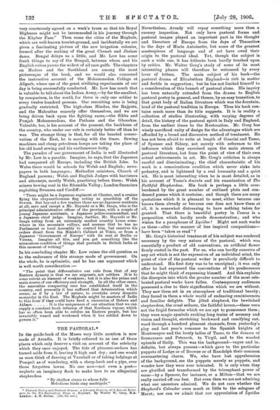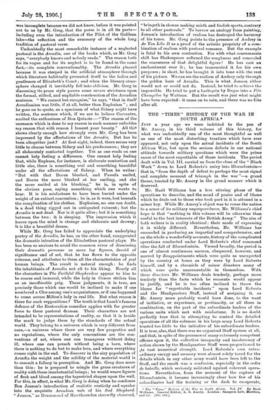THE PASTORAL.* Irr the guide-book of the Muses very little
mention is now made of Arcadia. It is briefly referred to as one of those places which only deserve a visit on account of the celebrity which they once enjoyed. The tide of pleasure-seekers has turned aside from it, leaving it high and dry ; and one would
as soon think of dancing at Vauxhall or of taking lodgings at Pompeii as of wandering, with a sheep-hook and a pipe, over those forgotten lawns. No one now—not even a poet—
neglects an imaginary flock to make love to an allegorical shepherdess
" By shallow rivers to whose falls Melodious birds sing madrigals."
• Pastoral Poetry and Pastoral Drama : a Literary Inangry, ari'h Special Refer- ence to the Pre-Restoration Stage in England. By Walter W. Greg, M.A. London : A. K. Bullen. flOe. Gd. net,' Nevertheless, Arcady will repay something more than a cursory inspection. Not only have pastoral forms and pastoral images played an important part in the thought and literature of Europe from the days of Theocritus, to the days of Marie Antoinette, but some of the greatest masterpieces of language and of art have owed their origin to the pastoral ideal. Yet, though the subject is- such a wide one, it has hitherto been hardly touched upon by critics. Mr. Walter Greg's study of some of its most interesting phases will therefore be . welcomed by every lover of letters. The main subject of his book—the pastoral drama of Elizabethan England—is rich in matter and fertile in suggestion ; but he has not limited himself to a consideration of this branch of pastoral alone. His inquiry has been naturally extended from the drama to English pastoral poetry in general, and thence, by an easy transition, to that great body of Italian literature which was the fountain. head of the pastoral tradition in Europe. Thus his book con- tains much more than its title suggests. It is in reality a collection of studies illustrating, with varying degrees of detail, the history of the pastoral spirit in Italy and England, from the earliest times to the Restoration. Mr. Greg has wisely sacrificed unity of design for the advantages which are afforded by a broad and discursive method of treatment. He has not been afraid to write at length of Guarini and T.asso, of Spenser and Sidney, not merely with reference to the influence which they exercised upon the main stream of pastoral literature, but from the point of view of their own actual achievements in art. Mr. Greg's criticism is always careful and discriminating ; the chief characteristic of his work is a conscientious erudition which never sinks into pedantry, and is lightened by a real humanity and a quiet wit. He is most interesting when he is most detailed, as in his account of Tasso's Aminta and his examination of The Faithful Shepherdess. His book is perhaps a little over- burdened by the great number of outlined plots and con- densed poems which it contains ; and though there are many quotations which it is pleasant to meet, either because one knows them already or because one does not know them at all, it is somewhat distressing to have nothing taken for granted. That there is beautiful poetry in Comas is a proposition which hardly needs demonstration ; and who wishes for a paraphrase of Lycidas? Might not such works as these—after the manner of less inspired compositions— have been "taken as read" P Mr. Greg's historical treatme nt of his subject was rendered necessary by the very nature of the pastoral, which was essentially a product of old conventions, an artificial flower firmly rooted in the past. For us, who can hardly conceive of any art which is not the expression of an individual mind, the point of view of the pastoral writer is peculiarly difficult to understand. His first duty was to be unoriginal ; it was only after he had expressed the conventions of his predecessors that he might think of expressing himself. And this explains the disrepute into which the greater number of the most cele- brated pastoral works have fallen. Contemporary audiences possessed a clue to their signification which we are without. They saw them set in an atmosphere of traditional beauty; they found in them a whole world of endearing reminiscences and familiar delights. The jilted shepherd, the bewitched shepherdess, the Cruel seducer, the faithful lovers,—these were not the frigid formulae which we are apt to pronounce them ; they were magic symbols evoking long trains of memory and vision and thought, stretching backward and ramifying out. ward through a hundred pleasant channels, from yesterday's play and last year's romance to the Spanish knights of Montemayor and the lovely ladies of Tasso, to the dreams of Sennazzaro and Tetrarch, to Virgil, and to the wooded uplands of Sicily. This was the background—vague and in- definite, but always present—which gave to the particular puppets of Lodge or of Browne or of Randolph their common overmastering charm. We, who have lost apprehension of the background, see the puppets merely as puppets, and wonder how they were ever tolerated. It is only when they are glorified and transformed by the triumphant power of verse—by a Spenser, for instance, or a Milton—that we are really carried off our feet. But even then we are not admiring what our ancestors admired. We do not care whether the Shepherd's Calendar owes much or little to the eclogues of Marot; nor can we admit that our appreciation of Lycidas
was incomplete because we did not know, before it was pointed out to us by Mr. Greg, that the poem is in all its parts— including even the introduction of the Pilot of the Galilean lake—the reflection and the summary of the whole long tradition of pastoral verse.
Undoubtedly the most remarkable instance of a neglected pastoral is the Arcadia, one of the books which, as Mr. Greg says, "everybody knows and nobody reads." The reason both for its vogue and for its neglect is to be found in the same fact,—its complete conventionality. The Arcadia pleased because it was steeped in the artificial atmosphere through which literature habitually presented itself to the ladies and gentlemen of Elizabeth's Court ; and when the literary atmo- sphere changed it inevitably fell into oblivion. Mr. Greg in discussing its prose style passes some severe strictures upon the formal, stilted, and unpliable construction of the Arcadian sentence. "We cannot but recognise," he says, "that in itself Arcadianism was little, if at all, better than Euphuism " ; and he goes on to quote, as a specimen of what Sidney might have written, the sentence which, if we are to believe Cervantes, excited the enthusiasm of Don Quixote :—" The reason of the unreason which is done to my reason in such manner enfeebles ray reason that with reason I lament your beauty." All this shows clearly enough bow strongly even Mr. Greg has been impressed by the affectations of the Arcadia. But has he been altogether just ? At first sight, indeed, there seems very little to choose between Sidney and his predecessors ; they are all elaborately contorted together. Yet as one reads on one cannot help feeling a difference. One cannot help feeling that, while Euphues, for instance, is elaborate contortion and little else, there is something real and something beautiful under all the affectations of Sidney. When he writes : "But with that Dorm blushed, and Pamela smiled, and Dorus the more blushed at her smiling, and she the more smiled at his blushing," he is, in spite of the obvious pose, saying something which one wants to bear. It is his misfortune to have been buried under the weight of an extinct convention ; he is, as it were, lost beneath the complication of his clothes. Euphuism, no one can doubt, is a dead thing rigged out in antiquated raiment ; but the Arcadia is not dead. Nor is it quite alive ; but it is something between the two : it is sleeping. The impression which it leaves upon the mind is strange and elaborate and drowsy ; it is like a beautiful dream.
While Mr. Greg has failed to appreciate the underlying poetry of the Arcadia, he has, on the other hand, exaggerated the dramatic intention of the Elizabethan pastoral playa. He has been so anxious to avoid the common error of dismissing their dramatis personae as mere lay figures, devoid of significance and of art, that be has flown to the opposite extreme, and attributes to them all the characteristics of real human beings. The result is natural enough : he finds the inhabitants of Arcadia not all to his liking. Nearly all the characters in The Faithful Shepherdess appear to him to be coarse and immoral, while the lady in Comas strikes him as an insufferable prig. These judgments, it is true, are precisely those which one would be inclined to make if one numbered a Cloe among one's acquaintance, or if one happened to come across Milton's lady in real life. But what reason is there for such suppositions ? The truth is that Lamb's famous defence of the Restoration comedies applies with far greater force to these pastoral dramas. Their characters are not intended to be representations of reality, so that it is beside the mark to judge them by the standards of the actual world. They belong to a universe which is very diff,erent from ours,—a universe where there are very few properties and no reputations, where the only conventions are the con- ventions of art, where one can transgress without doing ill, where one can 'preach without being a bore, where there is nothing to do but to make love, and where everything comes right in the end. To discover in the airy population of Arcadia the weight and the solidity of the material world is to commit a fallacy in perception. And Mr. Greg does more than this : he is prepared to mingle the gross creatures of reality with these insubstantial beings ; be would weave figures of flesh and blood among the tapestried shapes upon the wall, For this, in effect, is what Mr. Greg is doing when be condones Ben JOnson's introduction of realistic rusticity and squalor into the exquisite Arcadian web of his Sad Shepherd. " Jouson," as Drummond of Hawthornclen shrewdly observed, " bringeth in clowns making mirth and foolish sports, contrary. to all other pastorals." To borrow an analogy from painting, Jonson's introduction of realism has destroyed the harmony of his tones. Mr. Greg points to the presence of Audrey in As You Like It as a proof of the artistic propriety of a com- bination of realism with pastoral romance. But the example• is fatal to his own contention. For with what consummate skill has Shakespeare softened the roughness and concealed the coarseness of that delightful figure ! He has cast an enchantment over it ; he has transmuted it for his own purposes ; in short, he has brought it into tone with the rest of his picture. We can see the realism of Audrey only through the golden haze of Arcadia. This is what Jenson either would not or could not do. Instead, he tried to achieve the impossible. He tried to put a harlequin by Degas into a Fete Champetre by Watteau. But the result was just what might have been expected : it came on to rain, and there was no fete after all.







































 Previous page
Previous page